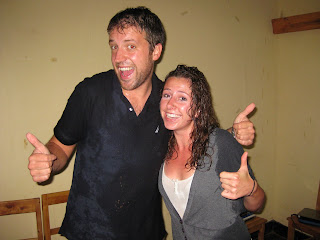Living with a host family is hardly what I would call easy and it is full of awkward miscommunications. I haven't forgotten the first day, on which I spent 10 minutes trying to explain to my host mother that I don't eat meat and thought I had succeeded...only to find that they had cooked it especially for my arrival later that night. On another occasion, I used the wrong broom (one that is apparently meant only for the walls of the house) to sweep my floor, which almost resulted in a shouting match between my host mother and I before Fanny was able to intervene and tell me that she wasn't trying to keep me from cleaning altogether. Once you start to get past moments like these, your homestay starts turning into a place that you can actually begin to be comfortable. In the time that it has taken for me to get to know her, my previously malicious old grandmother has transformed into a goofy old woman, who loves nothing more than being able to spend time with her grandkids.
Now that I've opened myself up to them, it seems that my host family teaches me something new each day. Sometimes this comes in the form of practical lessons, like how to effectively wash your clothing by hand (I can now say that some of my whites are whiter than they were even at home) or how to make fries over a wood-burning fire.
On other occasions, the lessons are more about gratitude and perspective. As an American, I am easily the most vulnerable and protected member of the family. On one night, I couldn't catch a taxi from the neighboring market village and showed up well after dark and well after when I said that I would be home. Fanny was panicked. She was terrified that something might happen to me because I was an American and that, if it did, she would go to prison for failing to protect me.
Of course, this makes absolutely no sense from an individualistic American standpoint, but from a Rwandan standpoint, it is perfectly logical. Not only is everything communal, but crime is considered to be especially communal since the genocide is still very much in living memory and was, itself, a communal crime. The failure of any community member to intervene is an instant indication that they may be responsible for any event that takes place, no matter how out of their hands.
Fanny's concerns also shed new light on my identity as an American and a citizen of the developed world. Identity is something that the privileged pay very little attention to, which is probably because it is so rarely a hindrance to them. However, when you make the shift from the developed to the undeveloped world, identity becomes infinitely more important. Not only do you have to consider the impact of your actions on the people who are responsible for you, such as your host family, but you also have to consider they way your previously thoughtless actions affect the community you are staying in. Frankly, foreigners are among the most interesting of topics for the isolated community in which we are training and this means that we are almost always watched. On more than one occasion, I have drawn a crowd who literally listened to my every word for multiple hours while I was trying to Skype with friends at home outside of the town's one location for wireless. This can be exhausting, but has made me incredibly grateful for the amount of difference I was exposed to growing up, which was, frankly, not all that much by American standards. It has given me the open-mindedness to see past the color of someone's skin and to view them as a human being, rather than an oddity.
With how much my family puts themselves out to care for me, I can hardly even begin to give back in the way that I wish that I could. For all the meals that they have given me, I have introduced them to PBJs (I'm planning on grilled cheese for tonight). For all of the language they have taught me, which is enough to navigate the village and survive, I have taught them the Hokey Pokey, Head-Shoulders-Knees-and-Toes, the Chicken Dance, and the Macarena, none of which they will ever need to get by in life. To date, my largest contribution to their well-being has been to bring fruit into the home and to encourage Fanny to go running with me. Last night, I tried the tactic of showing them photos of home and a map of the world, but the fact of the matter is that I will never be able to teach them as much as they have taught me without bringing them home. That's the real value of immersion. It's not that you learn a language or a couple of recipes, it's that you learn a whole new way of being. You lose the superficial parts of yourself that were really just byproducts of your environment and you determine the parts of yourself that are there to stay. I have no idea who I will be at the end of these two years, but Rwanda definitely has a lot to teach me.

(My host siblings performing the macarena)



